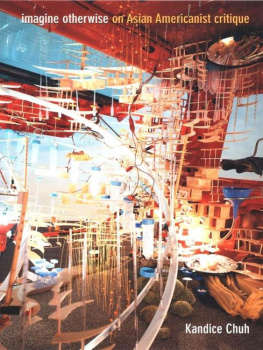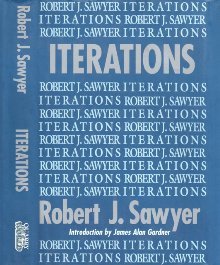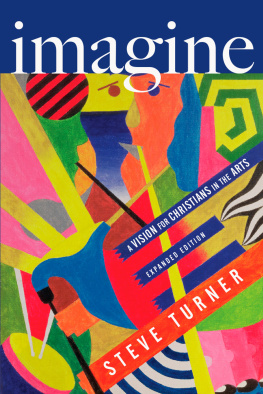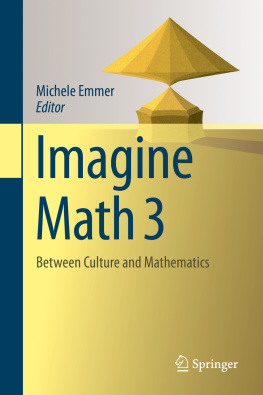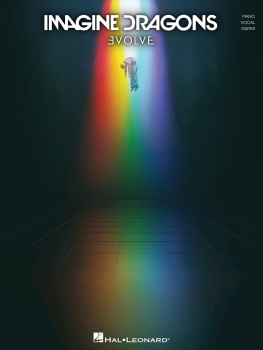Kandice Chuh - Imagine Otherwise
Here you can read online Kandice Chuh - Imagine Otherwise full text of the book (entire story) in english for free. Download pdf and epub, get meaning, cover and reviews about this ebook. year: 2003, publisher: Duke University Press, genre: Politics. Description of the work, (preface) as well as reviews are available. Best literature library LitArk.com created for fans of good reading and offers a wide selection of genres:
Romance novel
Science fiction
Adventure
Detective
Science
History
Home and family
Prose
Art
Politics
Computer
Non-fiction
Religion
Business
Children
Humor
Choose a favorite category and find really read worthwhile books. Enjoy immersion in the world of imagination, feel the emotions of the characters or learn something new for yourself, make an fascinating discovery.
- Book:Imagine Otherwise
- Author:
- Publisher:Duke University Press
- Genre:
- Year:2003
- Rating:4 / 5
- Favourites:Add to favourites
- Your mark:
- 80
- 1
- 2
- 3
- 4
- 5
Imagine Otherwise: summary, description and annotation
We offer to read an annotation, description, summary or preface (depends on what the author of the book "Imagine Otherwise" wrote himself). If you haven't found the necessary information about the book — write in the comments, we will try to find it.
Imagine Otherwise — read online for free the complete book (whole text) full work
Below is the text of the book, divided by pages. System saving the place of the last page read, allows you to conveniently read the book "Imagine Otherwise" online for free, without having to search again every time where you left off. Put a bookmark, and you can go to the page where you finished reading at any time.
Font size:
Interval:
Bookmark:
Duke University Press Durham & London
2003
2003 Duke University Press
All rights reserved
Printed in the United States of America on acid-free paper
Designed by C. H. Westmoreland
Typeset in Monotype Joanna by Keystone Typesetting, Inc.
Library of Congress Cataloging-in-Publication Data appear on the last printed page of this book.
to my parents, with love and gratitude
imagine otherwise
That life is complicated is a theoretical statement that guides efforts to treat race, class, and gender dynamics and consciousness as more dense and delicate than those categorical terms often imply. It is a theoretical statement that might guide a critique of privately purchased rights, of various forms of blindness and sanctioned denial; that might guide an attempt to drive a wedge into lives and visions of freedom ruled by the nexus of market exchange. It is a theoretical statement that invites us to see with portentous clarity into the heart and soul of American life and culture, and to track events, stories, anonymous and history-making actions to their density, to the point where we might catch a glimpse of what Patricia Williams calls the vast networking of our society and imagine otherwise. You could say this is a folk theoretical statement. We need to know where we live in order to imagine living elsewhere. We need to imagine living elsewhere before we can live there.
Avery Gordon, Ghostly Matters: Haunting and the Sociological Imagination (1997)
This book takes its title from Avery Gordons call to evoke the potential transformative power of envisioning life and culture in ways deeply cognizant of the diverse and intricate forms they assume. The idea of imagining otherwise captures my sense of Asian American literaturesof how they articulate the complexities of power and personhood involved in imagining and narrating relations to the nation, America, which is at the same time the same as and more than the U.S. nation-state. It evokes how they at once critique the ways of knowing forwarded in the name of America, but also work prophetically, presaging the elsewhere of Gordons folk theory. I mean this title, this idea, to inscribe Asian American literatures as epistemological projects engaged in a politics of knowledge. Imagine Otherwise advances a critical approach to the study of Asian American literatures that conceives of that work as theoretical devices that help us apprehend and unravel the narrative dimensions of naturalized racial, sexual, gender, and national identities. I argue for a definition of Asian American that relies not on the empirical presence of Asian-raced bodies in the United States for its intelligibility, but for one that instead emphasizes the fantasy links between body and subjectivity discursively forged within the literary and legal texts considered here. Imagine Otherwise attempts to demonstrate how this understanding can provide grounds for continuing to mobilize and deploy the term Asian American in light and in spite of contemporary critiques of its limitations. Informed by poststructural insights into the nature of language and knowledge, my interest here is in investigating the structures of power and meaning that give rise to identity and difference as national and racial epistemes. To imagine otherwise is not simply a matter of seeing a common object from different perspectives. Rather, it is about undoing the very notion of common objectivity itself and about recognizing the ethicopolitical implications of multiple epistemologiestheories about knowledge formation and the status and objects of knowledgethat underwrite alternative perspectives.
Although the title of this book draws from Avery Gordon, its arguments and, indeed, the very fact of its completion owe much to the critical generosity of many others. Most immediately, I acknowledge with deep thanks Lisa Lowe, whose rigorous readings of multiple drafts of the manuscript always offered in a spirit of constructive, collaborative effortwere in so many ways crucial to this endeavor. I am grateful to Ken Wissoker, at Duke University Press, who had an astonishing faith in this project when, at times, there was perhaps little reason to do so. I have also had the inestimable benefit of the sustaining friendship and intellectual camaraderie of Karen Shimakawa, who continues to shape my thinking in all of the important ways. Likewise, Nicole King and William Cohen were the most necessary of touchstones as I worked to complete this book. Both reached across distances and differences of various kinds to offer critical input and boundless support.
What I am describing in relation to all of those acknowledged here is precisely the practice of critical generosity. The phrase comes from David Romn and is particularly appropriately used here because he was instrumental to the development of the initial germs of this project during my years as a graduate student. Carolyn Allen, Tani Barlow, Evan Watkins, Shawn Wong, Traise Yamamoto, and, especially, Susan Jeffords have my great thanks as well in this regard. And I have been enormously fortunate to find colleagues at the University of Maryland who are equally critical and generous. In that context, I thank Jonathan Auerbach, Susan Leonardi, and particularly Robert Levine and Sangeeta Ray for offering truly helpful commentary on various chapters. Let me acknowledge also students at the University of Maryland with whom I have the privilege of working. The ways in which they challenge my thinking and energize my efforts are embedded in this book.
I am glad also to have the opportunity to thank Leti Volpp, who shares her work and engages with mine in the most productive of ways; and K. Scott Wong, whose critique was enormously important to the final shape of chapter 4 in particular. The insights I have mined from illuminating exchanges over the many years it has taken to complete this work with, variously, Cathy Davidson, Rosemary George, Gayatri Gopinath, Neil Gotanda, Judith Halberstam, Laura Hyun Yi Kang, Daniel Kim, George Lipsitz, Nayan Shah, Mary Helen Washington, and Lisa Yoneyama in many ways animate the arguments here. And Christine Dahlin, Rebecca Johns-Danes, and Fred Kameny at Duke University Press have my thanks for their work in shepherding this project through the publication process.
My parents, to whom this book is dedicated, patiently awaited and encouraged the completion of this work with characteristic sustaining love. Patricia Chuh, my extraordinary sister, made sure that I had what I needed both materially and emotionally to write this book. And Joshua Green, my partner in every way, suffered through the difficult parts of writing and celebrated with me the big and small accomplishments associated with this project. For buttressing my work efforts with unbounded support and teaching me daily the joys of living in difference, I am grateful. Various iterations of Browns, Greens, Gucks, and Gulnicks constitute the remainder of the amazing family network that I have relied upon in writing this book.
An earlier version of chapter 3 was previously published as Transnationalism and Its Pasts in Public Culture 9, no. 1 (1996): 93112.
on Asian Americanist critique
Asian American culture is the site of more than critical negation of the U.S. nation; it is a site that shifts and marks alternatives to the national terrain by occupying other spaces, imagining different narratives and critical historiographies, and enacting practices that give rise to new forms of subjectivity and new ways of questioning the government of human life by the national state.Lisa Lowe, Immigrant Acts: On Asian American Cultural Politics (1996)
Font size:
Interval:
Bookmark:
Similar books «Imagine Otherwise»
Look at similar books to Imagine Otherwise. We have selected literature similar in name and meaning in the hope of providing readers with more options to find new, interesting, not yet read works.
Discussion, reviews of the book Imagine Otherwise and just readers' own opinions. Leave your comments, write what you think about the work, its meaning or the main characters. Specify what exactly you liked and what you didn't like, and why you think so.

